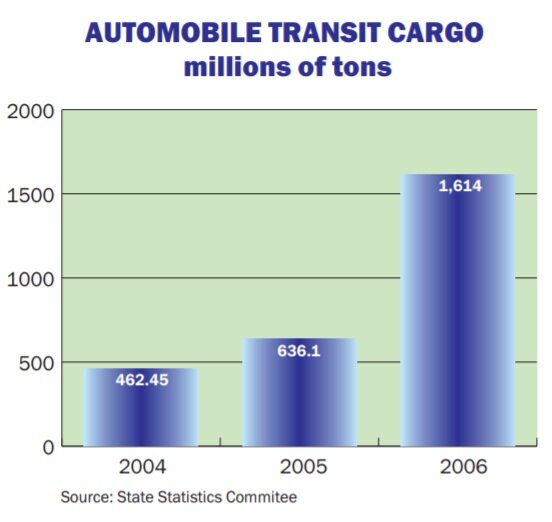The government approved Ukravtodor’s financing plan, which is expected to involve major Western lenders.
Ukraine’s government has given the green light to Ukravtodor, the state body in charge of Ukraine’s roads, to take out almost $1 billion in state-backed loans to fund repair of the country’s worn-out highways.
The government approved Ukravtodor’s financing plan, which is expected to involve major Western lenders, on March 28.
If approved by parliament, the nearly billion-dollar loan will be the largest single financial injection into independent Ukraine’s aging intra-national roadways, which are increasingly challenged by the demands of international commerce and booming car sales.
Ukravtodor’s construction and investment director, Valeriy Hamaliy, said some $960 million would be borrowed from the financial institution that wins a tender for the best credit terms.
“We will select the bank that gives the lowest interest rates, since the loan will be paid back by the state,” Hamaliy said.
“It will probably be an international financial institution that is capable of providing such money for a payback period of 10-15 years,” he added.
 According to Hamaliy, top candidates include the European Bank for Reconstruction and Development, Citibank and Deutsche Bank.
According to Hamaliy, top candidates include the European Bank for Reconstruction and Development, Citibank and Deutsche Bank.
Major repair works are planned for sections of Ukrainian highway between Kharkiv and Crimea, Lviv and Rivne, Odessa and Kyiv, and Odessa-Melitopol.
The result will be an increase in commercial transit capacity, in addition to higher-quality roads for private motorists.
Hamaliy said that this could be Ukravtodor’s biggest loan ever, “especially compared to Hr 1.7 billion ($340 million) [landed] in 2006.”
Last year, Ukravtodor received a credit line of $384 million from Citibank N.A. London for major repairs along the Kyiv-Odessa highway, minor improvements to the Kharkiv-Simferopol-Sevastopol roadway, and reconstruction along the Kyiv-Kharkiv motorway.
The EBRD issued Ukravtodor a $100 million loan in February 2005 to reconstruct a portion of the Kyiv-Chop highway near Lviv, which links Ukraine with Western Europe.
Hamaliy said Ukraine’s highways require much more investment, as most of them were built decades ago in Soviet days and cannot meet the demands of current automobile capacities.
According to the State Statistics Committee, the volume of transit cargo by automobiles grew from 636 million tons in 2005 to over 1.6 billion ton in 2006.
The committee said that transportation activity of cargo by automobile is second only to the use of railway transport.
In 2006, new car sales in Ukraine surged by 40 percent year-on-year to 371,019 vehicles. The total car market, including domestic resale of cars, reached 782,791 vehicles last year, with new car sales accounting for 47 percent of the total.
